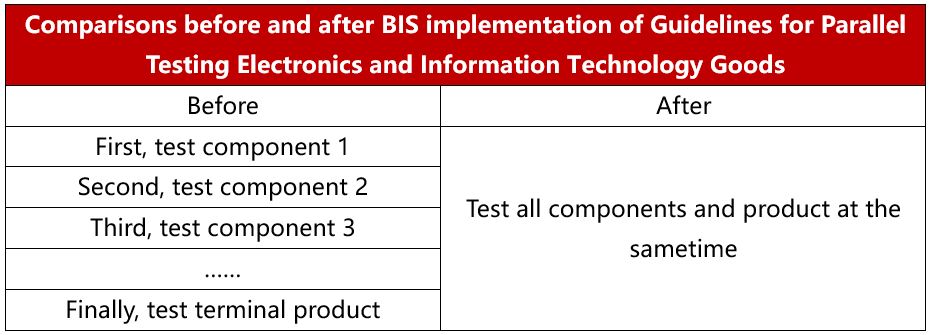.png)
Guidelines for parallel testing was issued on 19 December 2022 for Mobile Phones as a pilot project for a period of six months. Thereafter, due to low inflow of applications, the pilot project was extended further along with addition of two more product categories (a) Wireless Earphone and headphone (b) Laptop/Notebook/tablet. Based on the stakeholders’ consultation and consent from the Regulator, it has now been decided to convert the pilot project into a permanent scheme, BIS finally published Guidelines for implementation of Parallel Testing for Electronics and Information Technology Goods on 9 January 2024 .
Implementation Guide website link:
Detailed requirements in the implementation guidelines:
From 9 January 2024, manufacturers can generate parallel tests for all product categories under electronic and information technology products (mandatory registration order requirements) :
1)This guideline will enable parallel testing of electronic products covered under the Compulsory Registration Scheme (CRS) of BIS. These guidelines are voluntary in nature and the manufacturers will still have option for submitting application sequentially to BIS for registration as per the existing procedure.
2)All the components which require Registration under CRS can be sent for testing in parallel at any of BIS labs /BIS recognized labs. Under parallel testing, the lab will test the first component & issue test report. This test report no. along-with name of lab will be mentioned in the test report of second component. This procedure will be followed for subsequent components & final product also.
3)The registration of the components will be done sequentially by BIS.
4)At the time of submission of sample to lab as well as submission of application to BIS for registration, the manufacturer would give an undertaking covering the following requirements:
(i)The Manufacturer will bear the total risk (including the cost) in this procedure, i.e. in case, any of the applications is rejected/not processed at a later stage by BIS due to failure of sample in testing or submission of incomplete test report, the decision of BIS will be final;
(ii)The Manufacturer shall not supply / sell /manufacture the product in market without having valid registration;
(iii)The Manufacturer shall get the CCL updated immediately after getting the product(s) registered with BIS; and
(iv)Each manufacturer will have the responsibility to use components with relevant registration (R-no.) in case the component is covered in CRS.
5)The responsibility of linking an application with that of the previously submitted application in the chain shall vest with the manufacturer.
Parallel testing instructions and examples:
An example of procedure to be followed is given below for the purpose of illustration of the parallel testing:
A manufacturer of mobile phone requires cell, battery and power adapter for manufacturing the end product. All these components require Registration under CRS can be sent for testing in parallel at any of BIS labs /BIS recognized labs.
(i)BIS lab/BIS recognized labs can initiate testing of battery without R-number of cell. The lab will mention the test report no. along-with the name of lab (in place of R-Number of cell) in the final test report of the battery;
(ii)Similarly, the lab can initiate the testing of Mobile Phone without R-number of cell, battery & adaptor. The lab will mention the test report number(s) & name(s) of the lab for these components in the final test report of the mobile phone.
(iii)The lab shall evaluate the test report of the cell and issue the test report of the battery. Similarly, lab shall evaluate the test report of battery and adaptor before issuing the test report of Mobile phone.
(iv)The manufacturer can submit the applications in parallel for getting the components registered.
(v)However, BIS will follow sequential grant of licence i.e. the licence for mobile phone will be processed by BIS only after getting registration of all the components involved in the manufacturing of the final product (i.e. in this case mobile phones)
BACL International certification experts recommend:

After the publish of the implementation guidelines for the parallel testing on information technology products by India BIS, the testing time of the Indian BIS certification on electronic and information technology products will be greatly shortened, thus shortening the certification time and allowing products to enter the Indian market more quickly.
If you have any questions about BIS certification in India, please feel free to contact our sales window!
BACL Service:
BACL can provide you efficient and reliable global market certification services, such as IECEE CB Scheme NCB and CBTL, United States(NRTL, FCC, ENERGY STAR), Canada(ISED, SCC), EU(CE), United Kingdom (UKCA AB & AOC), Northern Ireland(UKNI), Korea(KC), Japan(MIC), Singapore(IMDA), Hong Kong(OFCA), Taiwan (NCC, BSMI), Egypt (NTRA, GOEIC), South Africa(SABS), Vietnam (MIC), Saudi Arabia (SASO, CITC), Philippines (NTC), Thailand (NBTC), Malaysia (SIRIM), India(BIS, WPC, TEC)and other services to assure your products still smoothly entering into the international trade market even when the international trade barriers are becoming increasingly fierce.

 CN/中国
CN/中国  US/USA
US/USA  KR/Korea
KR/Korea  DE/Germany
DE/Germany  ES/Spain
ES/Spain VN/Việtnam
VN/Việtnam